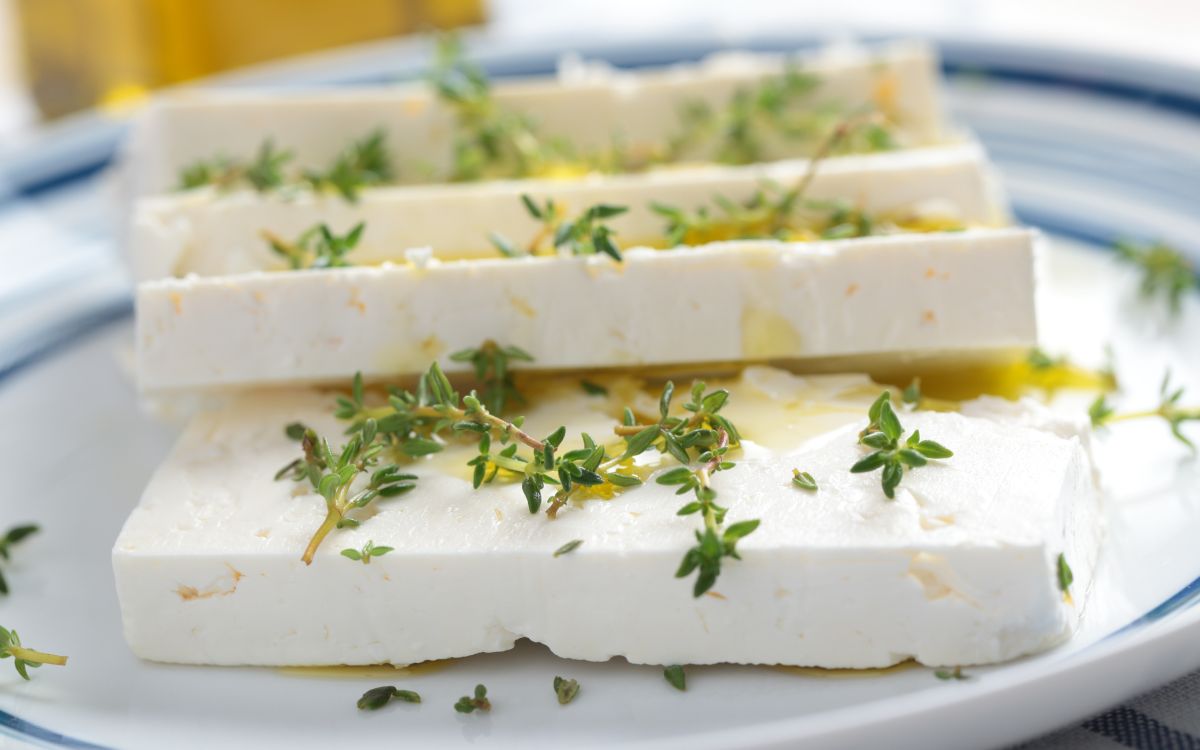While cheese often gets a bad rap for being high in fat and calories, feta cheese stands apart as a nutritious addition to your diet. With its distinct flavor and crumbly texture, feta cheese not only adds a delicious touch to your meals but also offers several health benefits that you may not be aware of. Whether you’re a cheese lover or looking to explore new additions to your diet, join us as we delve into the nutritional advantages of feta cheese and discover why it can be a valuable part of a healthy lifestyle.

The Nutritional Profile of Feta Cheese
Protein Powerhouse
Feta cheese is a remarkable source of protein, making it an excellent choice for those looking to meet their daily protein requirements. A 1-ounce serving of feta cheese contains approximately 4 grams of protein. Protein plays a crucial role in building and repairing tissues, supporting muscle growth, and promoting satiety, making feta cheese a satisfying addition to your diet.
Essential Vitamins and Minerals
In addition to protein, feta cheese is packed with essential vitamins and minerals that contribute to overall health. It contains notable amounts of calcium, phosphorus, vitamin B12, riboflavin (vitamin B2), and zinc. These nutrients are vital for various bodily functions, including bone health, energy metabolism, and the production of red blood cells.
Lower Calorie Option
Compared to other types of cheese, feta cheese is relatively lower in calories. This makes it a smart choice for individuals who are mindful of their caloric intake. While the exact calorie content can vary slightly, a 1-ounce serving of feta cheese typically provides around 75-80 calories. It allows you to enjoy the flavors and benefits of cheese while managing your overall calorie consumption.
Limited Fat Content
Feta cheese contains moderate amounts of fat, but the type of fat it contains can be beneficial for your health. It is primarily composed of saturated fats and monounsaturated fats, which are considered healthier options compared to trans fats. Consuming moderate amounts of healthy fats can contribute to a well-balanced diet and support various bodily functions.
Low Lactose Content
One advantage of feta cheese is its relatively low lactose content compared to other dairy products. This makes it a potential choice for individuals with lactose intolerance, as the fermentation process involved in feta cheese production reduces lactose levels. However, it is still important to assess personal tolerance and consult with a healthcare professional if necessary.
Sodium Considerations
It’s worth noting that feta cheese tends to be higher in sodium compared to some other cheeses. This can be a concern for individuals who need to limit their sodium intake due to specific health conditions such as high blood pressure. Moderation is key, and individuals should be mindful of their overall sodium consumption when incorporating feta cheese into their diet.
Quality and Freshness
When selecting feta cheese, opt for high-quality products made from good-quality milk. Freshness is also important as it can affect the taste and texture of the cheese. Look for feta cheese that is creamy, yet crumbly, with a tangy flavor. Proper storage and handling are essential to maintain the quality of feta cheese and ensure its nutritional value.
Feta Cheese and Bone Health
Calcium for Strong Bones
Feta cheese is a valuable source of calcium, a mineral essential for maintaining strong and healthy bones. Adequate calcium intake is crucial throughout life, especially during childhood and adolescence when bones are still developing. Incorporating feta cheese into your diet can contribute to meeting your daily calcium requirements and support optimal bone health.
Phosphorus Partnership
Alongside calcium, feta cheese also contains phosphorus, another vital mineral for bone health. Phosphorus works in synergy with calcium to form the mineralized structure of bones and teeth. Together, calcium and phosphorus support bone density and strength, helping to prevent conditions like osteoporosis and reduce the risk of fractures.
Vitamin B12 and Bone Metabolism
Feta cheese is a notable source of vitamin B12, a nutrient involved in bone metabolism. Vitamin B12 plays a crucial role in the production of red blood cells and the maintenance of nerve function. Additionally, research suggests that vitamin B12 deficiency may be linked to an increased risk of bone fractures, making feta cheese a valuable dietary choice.
Additional Bone-Strengthening Nutrients
In addition to calcium, phosphorus, and vitamin B12, feta cheese contains other nutrients that contribute to bone health. These include magnesium, zinc, and vitamin D. Magnesium helps with calcium absorption and supports bone mineralization, while zinc aids in bone formation and repair. Vitamin D is essential for calcium absorption and plays a key role in bone health overall.
Balancing Bone Health and Sodium Intake
While feta cheese offers benefits for bone health, it’s important to consider its sodium content. Excessive sodium intake can have negative effects on bone health by increasing calcium excretion. To maintain a healthy balance, it’s recommended to consume feta cheese in moderation and be mindful of overall sodium consumption from other sources in your diet.
A Well-Rounded Approach to Bone Health
While feta cheese can contribute to bone health, it is important to adopt a comprehensive approach. Regular weight-bearing exercises, such as walking or strength training, are crucial for maintaining strong bones. A balanced diet that includes a variety of nutrient-rich foods, along with adequate vitamin D and regular sunlight exposure, further supports optimal bone health.
Feta Cheese and Heart Health
Healthy Fats for Heart Health
Contrary to the misconception that all cheeses are high in unhealthy fats, feta cheese offers a favorable fat profile. It contains a combination of saturated fats and monounsaturated fats, which can have positive effects on heart health when consumed in moderation. These healthier fats can help maintain healthy cholesterol levels and reduce the risk of cardiovascular diseases.
Omega-3 Fatty Acids
Feta cheese contains a small amount of omega-3 fatty acids, which are renowned for their heart-protective properties. Omega-3s have been associated with reducing inflammation, improving blood vessel function, and lowering the risk of heart disease. While the levels in feta cheese may not be as high as in fatty fish, every little bit counts towards supporting heart health.
Nutrient Synergy for Cardiovascular Benefits
In addition to healthy fats and omega-3s, feta cheese contains several nutrients that work together to promote heart health. These include calcium, potassium, and magnesium. Calcium helps maintain normal blood pressure, while potassium and magnesium contribute to healthy heart rhythm and blood vessel function.
Sodium Considerations
It’s important to be mindful of the sodium content in feta cheese, as excessive sodium intake can contribute to high blood pressure, a risk factor for heart disease. Opt for lower sodium varieties or limit portion sizes to maintain a heart-healthy balance. Incorporating feta cheese into a diet rich in fruits, vegetables, whole grains, and lean proteins can help mitigate the impact of sodium.
Balanced Diet and Lifestyle
While feta cheese can be part of a heart-healthy diet, it’s important to approach heart health holistically. A balanced diet that includes a variety of nutrient-dense foods, such as fruits, vegetables, whole grains, lean proteins, and healthy fats, along with regular physical activity, is key for maintaining cardiovascular well-being. Feta cheese can complement this approach when consumed as part of an overall healthy lifestyle.
Feta Cheese and Weight Management
Satiety and Protein Content
Feta cheese’s protein content can contribute to feelings of fullness and satiety, making it a beneficial addition to a weight management plan. Protein takes longer to digest, keeping you satisfied for longer periods and potentially reducing overeating or snacking between meals. Including feta cheese in meals can help promote portion control and prevent excessive calorie intake.
Muscle Maintenance and Fat Loss
Protein is essential for maintaining and building lean muscle mass. When combined with regular exercise, consuming an adequate amount of protein can support muscle maintenance during weight loss. Feta cheese’s protein content helps preserve muscle while encouraging the loss of body fat, contributing to a healthier body composition during weight management.
Lower Calorie Alternative
Compared to many other types of cheese, feta cheese offers a lower calorie option. A 1-ounce serving of feta cheese typically provides around 75-80 calories, allowing you to enjoy the flavor and texture of cheese without significantly impacting your daily calorie intake. It can be a satisfying ingredient or topping for salads, sandwiches, or vegetable-based dishes.
Flavor Enhancer and Versatile Ingredient
Feta cheese’s distinct tangy flavor and crumbly texture can elevate the taste of various dishes. By adding feta cheese to your meals, you can enhance the flavor and satisfaction of your food, making healthier options more appealing. It can be incorporated into salads, omelets, wraps, or roasted vegetables, providing a burst of flavor while keeping calorie intake in check.
Moderation and Balance
While feta cheese can be a beneficial component of a weight management plan, it’s important to consume it in moderation as part of a balanced diet. Although it offers nutritional advantages, feta cheese is still a calorie-dense food. It’s essential to consider portion sizes and the overall calorie content of your meals to ensure you’re maintaining a calorie deficit for weight loss, if desired.
Feta Cheese and Immune Function
Immune-Boosting Nutrients
Feta cheese contains various nutrients that support immune function. It is a good source of vitamins A and B12, both of which play essential roles in maintaining a healthy immune system. Vitamin A helps regulate immune responses, while vitamin B12 supports the production of immune cells, such as white blood cells.
Antioxidant Properties
Feta cheese may also offer antioxidant benefits, which can contribute to immune health. Antioxidants help protect cells from damage caused by free radicals and oxidative stress. Feta cheese contains certain antioxidants, such as vitamin E and selenium, that help neutralize free radicals and support immune function.
Probiotics for Gut Health
Feta cheese, like other fermented dairy products, can contain live probiotic cultures that promote a healthy gut microbiome. These beneficial bacteria, such as Lactobacillus and Bifidobacterium strains, can support immune function by maintaining a balanced gut environment. A healthy gut is crucial for optimal immune responses and overall well-being.
Vitamin C Content
While feta cheese is not a significant source of vitamin C compared to fruits and vegetables, it still contributes a small amount to your overall intake. Vitamin C is well-known for its immune-boosting properties. Although feta cheese may not provide substantial amounts, it can still contribute to the overall nutrient profile of a balanced diet.
Supporting Overall Health
Maintaining a robust immune system is crucial for overall health and well-being. By including feta cheese in your diet, you can benefit from its immune-boosting nutrients, antioxidant properties, and potential probiotic content. Remember that a diverse and balanced diet, along with other healthy lifestyle habits, is key to supporting immune function and overall vitality.
Conclusion
In conclusion, feta cheese is not only a delight for your taste buds but also a nutritious addition to your diet. Packed with protein, calcium, and a range of essential vitamins and minerals, feta cheese offers various health benefits. From supporting bone health and boosting your immune system to promoting heart health and aiding in weight management, the nutrients found in feta cheese make it a valuable component of a balanced diet.








